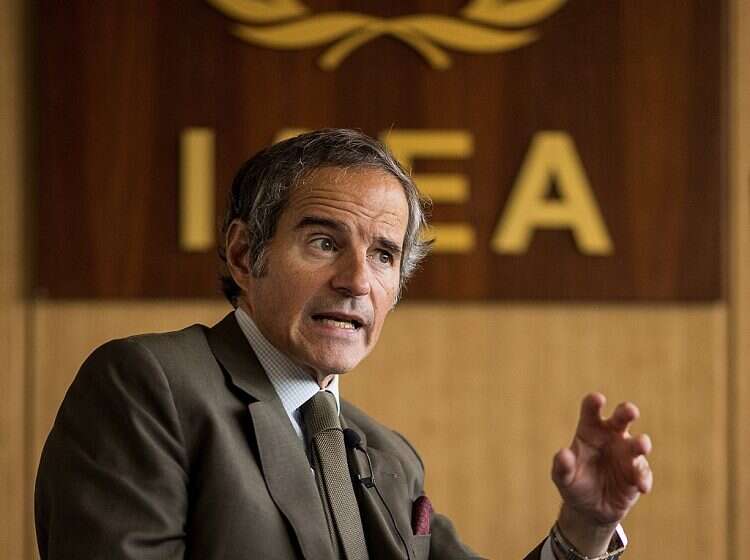The UN nuclear chief warned that Europe's largest nuclear power plant in Ukraine "is completely out of control" and issued an urgent plea to Russia and Ukraine to quickly allow experts to visit the sprawling complex to stabilize the situation and avoid a nuclear accident.
Follow Israel Hayom on Facebook, Twitter, and Instagram
Rafael Grossi, director general of the International Atomic Energy Agency, said Tuesday that the situation is getting more perilous every day at the Zaporizhzhia plant in the southeastern city of Enerhodar, which Russian troops seized in early March, soon after their Feb. 24. invasion of Ukraine.
"Every principle of nuclear safety has been violated" at the plant, he said. "What is at stake is extremely serious and extremely grave and dangerous."
Grossi cited many violations of the plant's safety, adding that it is "in a place where active war is ongoing," near Russian-controlled territory.
The physical integrity of the plant hasn't been respected, he said, citing shelling at the beginning of the war when it was taken over and continuing information from Ukraine and Russia accusing each other of attacks at Zaporizhzhia.

There is "a paradoxical situation" in which the plant is controlled by Russia, but its Ukrainian staff continues to run its nuclear operations, leading to inevitable moments of friction and alleged violence, he said. While the IAEA has some contacts with staff, they are "faulty" and "patchy," he said.
Grossi said the supply chain of equipment and spare parts has been interrupted, "so we are not sure the plant is getting all it needs." The IAEA also needs to perform very important inspections to ensure that nuclear material is being safeguarded, "and there is a lot of nuclear material there to be inspected," he said.
"When you put this together, you have a catalog of things that should never be happening in any nuclear facility," Grossi said. "And this is why I have been insisting from day one that we have to be able to go there to perform this safety and security evaluation, to do the repairs and to assist as we already did in Chernobyl."
The Russian capture of Zaporizhzhia renewed fears that the largest of Ukraine's 15 nuclear reactors could be damaged, setting off another emergency like the 1986 Chernobyl accident, the world's worst nuclear disaster, which happened about 110 kilometers (65 miles) north of the capital Kyiv.
Russian forces occupied the heavily contaminated site soon after the invasion but handed control back to the Ukrainians at the end of March. Grossi visited Chernobyl on April 27 and tweeted that the level of safety was "like a `red light' blinking." But he said Tuesday that the IAEA set up "an assistance mission" at Chernobyl at that time "that has been very, very successful so far."
The IAEA needs to go to Zaporizhzhia, as it did to Chernobyl, to ascertain the facts of what is actually happening there, to carry out repairs and inspections, and "to prevent a nuclear accident from happening," Grossi said.
The IAEA chief said he and his team need protection to get to the plant and the urgent cooperation of Russia and Ukraine.
Each side wants this international mission to go from different sites, which is understandable in light of territorial integrity and political considerations, he said, but there's something more urgent and that is getting the IAEA team to Zaporizhzhia.
"The IAEA, by its presence, will be a deterrent to any act of violence against this nuclear power plant," Grossi said. "So I'm pleading as an international civil servant, as the head of an international organization, I'm pleading to both sides to let this mission proceed."
Grossi was in New York to deliver a keynote speech at Monday's opening of the long-delayed high-level meeting to review the landmark 50-year-old Nuclear Nonproliferation Treaty aimed at preventing the spread of nuclear weapons and eventually achieving a nuclear-free world.
The IAEA chief also spoke about efforts to revive the 2015 nuclear deal between Iran and major powers that the Trump administration abandoned in 2018 and the Biden administration has been working to renew.
Grossi said there is "an ongoing effort to try to go for yet another meeting or round to explore possibilities to come to an agreement." He said he heard the meeting "could be soon."
US Secretary of State Antony Blinken told the NPT review conference on Monday that Iran "has either been unwilling or unable" to accept a deal to return to the 2015 agreement aimed at reining in its nuclear program.
Grossi said "there are important differences among the negotiating parties" and important verification issues related to past activities that Iran needs to address. "It's not impossible, it's complex," he said.
If the nuclear agreement, known as the JCPOA, is not extended, he said some IAEA inspections will continue. But the JCPOA provides for additional transparency and inspections "which I deem as extremely important, very necessary, because of the breadth and depth of the nuclear program in Iran," he said.
Grossi stressed that cooperating with the IAEA, answering its questions, and allowing its inspectors to go wherever they need to be, is essential for Iran to build trust and confidence. "Promises and good words will not do," he said.
On another issue, Grossi said last September's deal in which the United States and Britain will provide Australia with nuclear reactors to power its submarines requires an agreement with the IAEA to ensure that the amount of nuclear material in the vessel when it leaves port is there when it returns.
He said Australia hasn't decided what type of vessel it will be getting, so while there have been preparatory talks, substantive talks can't begin.
Because it's a military vessel, Grossi said, "there are lots of confidential and protection of information measures that need to be embedded into any such agreement, so it's very complex technologically."
Subscribe to Israel Hayom's daily newsletter and never miss our top stories!




